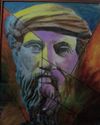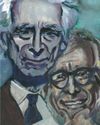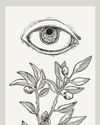
I want to begin this article with the assumption that reality consists entirely of physical things and the forces which bind them. That is to say, I will assume the truth of materialism: the idea that the only things that ultimately exist are matter, energy, and physical forces. I will argue that this is consistent with a ‘materialistic compatibilism’ which preserves some sense of freedom and responsibility, and that this implies a positive conception of political and social liberty.
You might wonder what on earth might possess me to want to start with something like that, but as I unpack it, I hope you’ll see that it makes sense.
Reality Consists of Physical Things
A materialist view of the world might strike you as characteristically modern and Western. In fact, it isn’t quite so modern, as Democritus was talking about reality consisting of ‘atoms and the void’ 2,500 years ago. You might be itching to tell me that the idea is not originally a Western one, either. Nevertheless, let’s acknowledge that, for most of history, most people have lived with an explicitly dualist understanding of reality: they’ve thought that the world consists of what we might call ‘lumps of stuff’ on the one hand, and minds, spirits, or souls on the other. Yet what a great number of us think these days is that consciousness is not some non-physical thing, but something physical which emerges from the processes of the brain.
この記事は Philosophy Now の December 2023 / January 2024 版に掲載されています。
7 日間の Magzter GOLD 無料トライアルを開始して、何千もの厳選されたプレミアム ストーリー、9,000 以上の雑誌や新聞にアクセスしてください。
すでに購読者です ? サインイン
この記事は Philosophy Now の December 2023 / January 2024 版に掲載されています。
7 日間の Magzter GOLD 無料トライアルを開始して、何千もの厳選されたプレミアム ストーリー、9,000 以上の雑誌や新聞にアクセスしてください。
すでに購読者です? サインイン

FALLING DOWN
Thomas R. Morgan considers how personal identity is maintained, and how it is lost.

Pythagoras (570-495 BCE)
Daniel Toré looks beyond the mathematician to the philosopher.

Wordsworth & Darwin
Christine Avery wonders whether poetry can help us to deal with science.

Plants & Philosophy
Caroline Deforche sees similarities between gardening and philosophising.

Dr.Gindi sculptor, has a philosophical conversation with Richard Baron about sensation, life, infinity and, you guessed it, sculpture.
Dr. Gindi is one of Switzerland's foremost sculptors, whose work has been exhibited in many countries.

Thomas Aquinas on Extraterrestrial Life
Babatunde Onabajo tells us why Aquinas did not believe in aliens.

The Fire This Time
Tim Madigan on Ray Bradbury, Bertrand Russell and Fahrenheit 451.

Trust, Truth & Political Conversations
Adrian Brockless wants a recognition of human value in political debate.

Philosophy & The Crown
Vincent Di Norcia on monarchy and stability.

Technologists & Ethicists
Stephen L. Anderson laments inadequate moral insight among tech leaders.